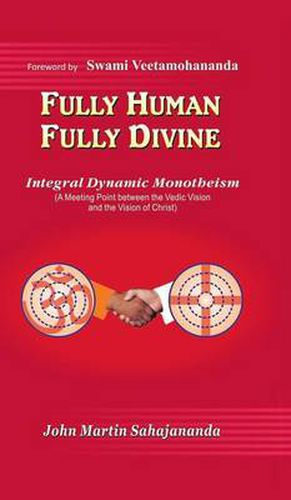Readings Newsletter
Become a Readings Member to make your shopping experience even easier.
Sign in or sign up for free!
You’re not far away from qualifying for FREE standard shipping within Australia
You’ve qualified for FREE standard shipping within Australia
The cart is loading…






This title is printed to order. This book may have been self-published. If so, we cannot guarantee the quality of the content. In the main most books will have gone through the editing process however some may not. We therefore suggest that you be aware of this before ordering this book. If in doubt check either the author or publisher’s details as we are unable to accept any returns unless they are faulty. Please contact us if you have any questions.
Fully Human-Fully Divine: Integral Dynamic Monotheism, a Meeting Point between the Vedic Vision and the Vision of Christ is the latest book of John Martin Sahajananda. This books deals with finding the answer to the fundamental question: Who are human beings? He looks for the answer to this basic question in two categories of spiritual traditions, viz., prophetic tradition and wisdom tradition. The wisdom tradition seems to focus on our oneness with God and the prophetic tradition on our humanness. He proposes a view that integrates these two views in an inclusive way. We are fully human and also fully divine. He looks at spiritual life as a dynamic process of evolution in relationship with God. This process he describes as Integral Dynamic Monotheism. In the second part of the book, he explains to us about similarities between the spiritual awakening and spiritual evolution in the Vedic tradition and the biblical tradition. He shows how close these great traditions can come, and when they come close together, they realize what they need from one another to make them richer and fuller. Thus he says that the challenge of Upanishadic tradition to Christianity is to open the nondualistic experience of Jesus, which is the radical love of God for all the Christians. In the same way, the challenge of Christ to the Vedic tradition is to translate its nondualistic wisdom of God, which is the radical love of God, into nondualistic action and social transformation that is the radical love of one’s neighbor.
$9.00 standard shipping within Australia
FREE standard shipping within Australia for orders over $100.00
Express & International shipping calculated at checkout
Stock availability can be subject to change without notice. We recommend calling the shop or contacting our online team to check availability of low stock items. Please see our Shopping Online page for more details.
This title is printed to order. This book may have been self-published. If so, we cannot guarantee the quality of the content. In the main most books will have gone through the editing process however some may not. We therefore suggest that you be aware of this before ordering this book. If in doubt check either the author or publisher’s details as we are unable to accept any returns unless they are faulty. Please contact us if you have any questions.
Fully Human-Fully Divine: Integral Dynamic Monotheism, a Meeting Point between the Vedic Vision and the Vision of Christ is the latest book of John Martin Sahajananda. This books deals with finding the answer to the fundamental question: Who are human beings? He looks for the answer to this basic question in two categories of spiritual traditions, viz., prophetic tradition and wisdom tradition. The wisdom tradition seems to focus on our oneness with God and the prophetic tradition on our humanness. He proposes a view that integrates these two views in an inclusive way. We are fully human and also fully divine. He looks at spiritual life as a dynamic process of evolution in relationship with God. This process he describes as Integral Dynamic Monotheism. In the second part of the book, he explains to us about similarities between the spiritual awakening and spiritual evolution in the Vedic tradition and the biblical tradition. He shows how close these great traditions can come, and when they come close together, they realize what they need from one another to make them richer and fuller. Thus he says that the challenge of Upanishadic tradition to Christianity is to open the nondualistic experience of Jesus, which is the radical love of God for all the Christians. In the same way, the challenge of Christ to the Vedic tradition is to translate its nondualistic wisdom of God, which is the radical love of God, into nondualistic action and social transformation that is the radical love of one’s neighbor.